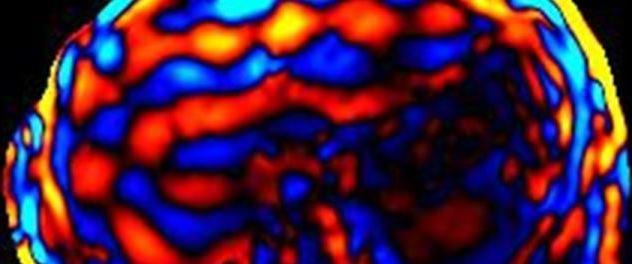 Using mechanical waves to diagnose liver disease
Using mechanical waves to diagnose liver disease
Researchers in Dr. Ehman's Advanced Magnetic Imaging Technology Laboratory at Mayo Clinic use magnetic resonance elastography to determine the stiffness (fibrosis level) of the liver without a biopsy.
Overview
Dr. Ehman's Advanced Medical Imaging Technology Laboratory seeks to expand the range of tissue, organ and system characteristics that magnetic resonance imaging (MRI) techniques can evaluate noninvasively. A major research focus is to further develop and explore novel applications of a technology known as magnetic resonance elastography (MRE).
MRE, which was invented at Mayo Clinic, uses MRI to directly image propagating acoustic waves in tissues, allowing images of mechanical properties to be generated. Dr. Ehman's lab pioneered the development of the first established clinical application of MRE: noninvasive detection of hepatic fibrosis.
Chronic liver disease is a serious problem worldwide, and hepatic fibrosis is the most important consequence. Hepatic fibrosis can eventually lead to cirrhosis, which is irreversible and associated with high mortality.
After extensive work to develop a method to reliably generate shear waves in the liver, the team developed technology for applying MRE to assess hepatic fibrosis. MRE-measured hepatic stiffness increases systematically with the fibrosis stage. Clinical experience indicates that MRE is at least as accurate as liver biopsy, while also being safer, more comfortable and less expensive.
The Advanced Medical Imaging Technology Lab focuses on developing technology and exploring the potential applications of MRE in assessing many other body systems. Studies have demonstrated that it is feasible to apply MRE to quantitatively assess the mechanical properties of skeletal muscle and tissue in the brain, thyroid, breast, myocardium, kidney, liver and skin. Among these applications, assessment of the brain has emerged as one of the most promising future clinical applications. The team's research has demonstrated promising results using these new biomarkers to help plan surgery in patients with brain tumors and as diagnostic tools in neurodegenerative diseases.
Affiliations
Dr. Ehman's Advanced Medical Imaging Technology Lab is affiliated with several Mayo Clinic research areas:
Resources